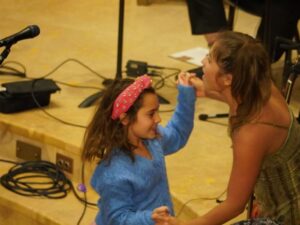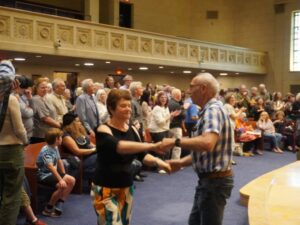Growing up as a musician, Rabbi Marcus Rubinstein always wanted to record an album. With the release of Jewbalaya’s “A Schmaltzy Stew,” that goal has been met.
“This is my dream band that I’ve wanted to have since elementary school when I fell in love with Louis Armstrong, but could never get all the elements right,” he said.
Jewbalya is made up of Erin Baldinger (trombone), Bob Barnes (accordion), Lea Kalisch (vocal), Rabbi Tobias Divack Moss (banjo, mandolin, guitar), Dan Perelstein (clarinet), Rabbi Marcus Rubinstein (cornet), and Jason Swalley (tuba). For the June 6 album release party at Temple Israel, the band featured guest musicians Kevin Washington (drums, percussion), and Coleen Dieker (violin). The album is available for streaming.
“It’s really nice when people come with good energy. It just amplifies the experience,” said Kalisch after the release party show. ”It was a really beautiful celebration. I loved seeing people dance. We have some groupies, some diehard fans who know what to expect. Good energy is contagious and people want to have fun. So the more the merrier.”
The band is a mix of the New Orleans jazz that Rubinstein grew up on – and was a trumpet jazz major in college – with traditional Klezmer.
“[Marcus], Leah and I connected, and we were talking about, what we do with with Yiddish music,” Moss said. “It was definitely Marcus’s brainchild. His dream was to combine his passions of New Orleans jazz with Jewish elements.”

Cecelia Liebo dances with Jewbalaya fiddler Coleen Dieker at the Jewbalaya album release concert. (Lonny Goldsmith/TC Jewfolk)
Rubinstein was already playing with a trio of other horn players in Baldinger, Perelstein and Swalley, who all came in at the beginning of the endeavor. At the album release event, the band was joined by Washington, a master drummer and multi-instrumentalist, and Dieker, a traveling violin and fiddle player who is a fixture at Temple of Aaron as a visiting musician. Dieker also played on a couple of the album’s tracks.
The album was recorded by Joe Mabbott at Hideaway Studios, and Moss said that in addition to crowd-funding, an anonymous Temple Israel donor helped pay for the album.
“It came out so amazingly well,” Moss said. “For no one [in the band] is this their only project. But we’ve created these great, unique arrangements, we all felt it was worth it to to devote our time to this.”
Moss said that the two styles of music – New Orleans jazz and klezmer – work well together.
“Both are celebratory music, street-musician music, and both very informal,” Moss explained. “Every time you play one of these tunes, you ornament the melody differently, the clarinet and the trumpet switch parts. It’s a very improvisatory, open-to-the-moment kind of music, and so in that way, they really blend well together.”
The diasporic nature of the Jewish community helps in bringing different musical influences into Jewish music.
“That’s like the vibe of New Orleans: a true melting pot of so many different cultures. So both klezmer and New Orleans music allow for, like, different different ideas and different genres and different languages to come in,” Moss said. “As the name Jewbalaya suggests, if you just put anything in a stew it works, right?”
The album has a little bit of everything: Yiddish, covers of blues songs, and medleys – like “Hava Nagila” with “The Saints Go Marching In.”
Rubinstein said the goal was to create a joyful experience.

Svetlana and Tziyon Bakal dancing at the Jewbalaya album release concert at Temple Israel on June 6. (Lonny Goldsmith/TC Jewfolk)
“I’m really proud of the music. We have great musicians on [the album], and Lea is really talented. I’m just really proud of the product,” he said. Perelstein, a music teacher at Washington Technology Magnet in St. Paul is a finalist for The Manilow Music Project Teacher of the Year award. “Jazz has a reputation where you have to be super-intellectual or it isn’t for everyone. That’s not what we’re going for.”
Rubinstein said that Jewbalaya calls back to an earlier era of jazz that is more entertaining.
“[As a band,] we’re completely aligned on that,” he said. “This is what people need and need to celebrate even with antisemitism on the rise and Israel under attack. The joy sustains us.”
Kalisch was critical of her performance at the release party – as many performers are – but she said she was more concerned with getting people to dance than her singing well.
“I can do both but my attention is always with the audience,” she said. “The biggest thing for me getting the kids to get up. Getting bashful people up is my mission. Joy is for everybody.”
The album release show isn’t so much a farewell show for Jewbalaya as it is a farewell-for-now show. Moss said he and Kalisch hope to return annually to see friends and play reunion shows.
“It could have been like ‘OK, let’s start winding down the band,’ but instead we’ve done the opposite,” Moss said. “We ramped things up in terms of pulling off this album, but also the whole horn section is staying intact and is going to continue to book gigs and find a next iteration of Jewbalaya for the Twin Cities. And Lea and I will take some of these arrangements and see what we can do with them as we meet musicians in Europe.”




















I just bought it, thanks for the article!